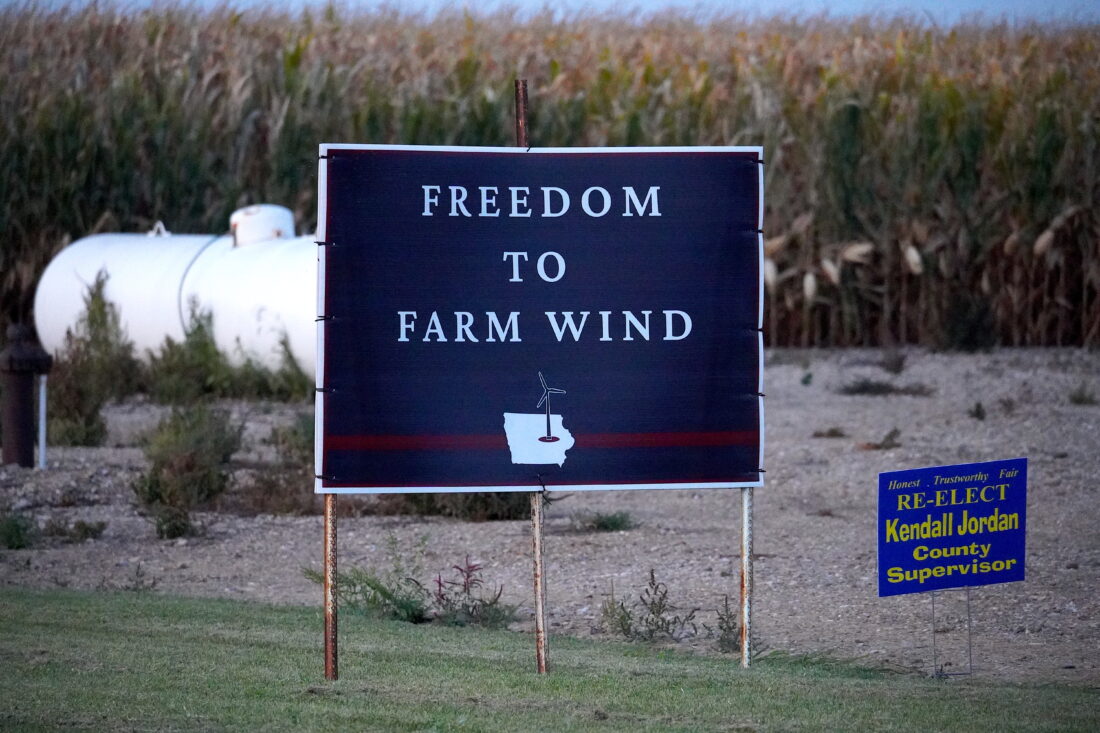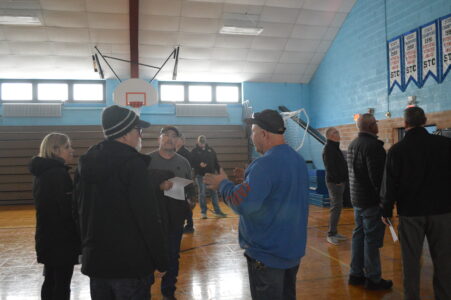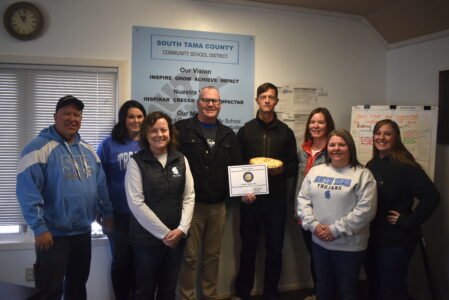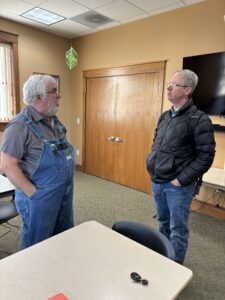Salt Creek Wind II development vote fails 3-2
Matter heads to Board of Adjustment for further review

A 'Freedom to Farm Wind' sign located along US 63 in the footprint of Salt Creek Wind Phase I. PHOTO BY RUBY F. MCALLISTER
TOLEDO – Commercial wind energy development in Tama County has hit another wall.
This past Monday, Sept. 15, the Tama County Board of Supervisors was expected to take action on several agenda items related to the Salt Creek Wind Phase II project including the following:
-Approve decommissioning plan with SCW 2
-Approve development agreement with SCW 2 (modified as it was originally posted as “settlement agreement”)
-Approve road use agreement with SCW 2
The meeting, which lasted over five hours with multiple recesses, included lengthy discussion between Salt Creek Wind II owner Sean Roberts and the supervisors related to the details of the development agreement and modifications requested by Supervisor Heather Knebel. Roberts expressed concern about having to return to the county every 90 days to request extensions on building permits, and Supervisor David Turner lamented that it would effectively amount to adding more government bureaucracy to the process.
“We also need to be able to, when we start a project, know we can get to the end,” Roberts said. “You cannot build a project in 90 days. It’s just impossible.”
Roberts also agreed to provide updates to Daleske and Zoning Administrator Laura Wilson every 30 days. At one point, Board Chairman Mark Doland took issue with Wilson’s interpretation of “substantial beginnings” and argued that a judge had already ruled in Salt Creek’s favor on Phase I in court — which sparked further debate over whether the word “must” meant “must.”
“You can have your opinion all you want, but we have to interpret the way the judge is going to rule, and we have no reason to interpret that they’re going to rule any differently with the same argument on the same topic,” Doland said.
About an hour in, Supervisor Curt Hilmer indicated that he would be voting no and sending the matter back to the Board of Adjustment, and he subsequently asked for Salt Creek Wind Phase I leaseholder and former Tama County Zoning Commissioner Craig Sash, who farms southwest of Traer, to be removed from the meeting after a heated exchange during which the outspoken pro-wind activist told the supervisor to “shut up.” Knebel also pushed Roberts for clarification on Salt Creek III and for additional noise reduction, setback measures and height restrictions, the last of which Roberts said would jeopardize the feasibility of the project.
“What do you guys think? Would you sign up to settle this and give someone a 639-foot turbine next to their house or their acreage or their field? They can do it if they want to. We sign this, it’s a done deal. They can do whatever they want,” Knebel said.
Despite the points of contention, Knebel did thank Roberts for engaging in open dialogue with the board, and he pledged to be “a good neighbor” well into the future.
In the middle of the afternoon after over four hours of discussion, approval of the development agreement, decommissioning plan and road use agreement failed by a vote of 3-2 with Hilmer, Knebel, and Curt Kupka voting against; Doland and Turner voted in favor. Before the vote, each supervisor had the chance to share his or her own comments, and the forum was once again then opened up to the public. Hilmer reiterated his intention to vote no while expressing frustration with “lies and bullying” and wind subsidies and arguing that most farmers aren’t actually struggling, and he felt farmers were being taken advantage of by politicians in Washington “dangling” payments.
Turner cited tax revenues, landowners rights, the widespread support for SCWII within the Tama-Toledo area and the potential for another court battle. Knebel called to send the matter back to the Board of Adjustment because SCWII could not meet the current ordinances and despite voting no, didn’t feel it was the end of the conversation. She also felt the proposed $1.3 million payment was the only thing the county was truly gaining.
Doland worried that all of the progress on negotiations would be lost with a no vote and said his primary objective was to avoid another costly lawsuit. Curt Kupka urged the board to simply take the vote and he would explain his position later.
Doland then spoke again of the time invested in the process and the fact that the Vienna and Salt Creek I projects already exist in Tama County, and the first comment drew a sharp rebuke from Knebel, who called herself “the wind person” and said she had been excluded from negotiations.
“You got elected knowing there’s a wind issue. If you don’t want to spend the time, you shouldn’t have ran,” she said. “The people have spoken and they don’t want it, so I get sick and tired of ‘Oh, it takes so much time.’ Do other stuff. Let me handle it, but you didn’t want to… Don’t give me this time thing. I’m getting sick and tired of hearing that. People’s rights are important.”
Before the final vote, the supervisors heard public comments for about 20 minutes. Sheriff Casey Schmidt did note that based on the studies he’d read, turbines would not have any impact on 911 radio towers, and the company would be responsible for rectifying interference. The final commenter, who opposed the project, likened the situation to David and Goliath and urged the supervisors to stand tall against a large, out of state corporation.
The matter will now go to the Board of Adjustment for further review.
At the beginning of the discussion Monday, Doland said he and Turner had already spent six hours with Roberts the prior Saturday and three more that Sunday. Additionally, a public hearing was held at the Reinig Center in Toledo on Thursday, Sept. 11 and ran nearly two hours with comments on both sides of the issue, including STC and North Tama Superintendent John Cain, Toledo Mayor Brian Sokol and Toledo Economic Development Director Katherine Ollendieck all speaking in favor of the project due to the potential future tax revenues for the school district.






